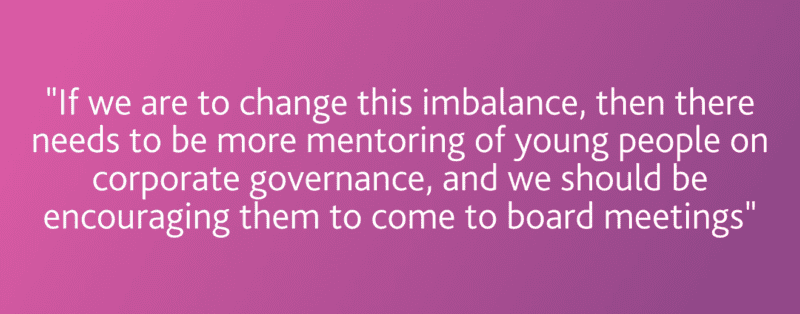Corporate governance at listed companies is undergoing a marked transformation.
Not only is the composition of boards changing, but so too are their practices, which is being facilitated by the growing emphasis on environmental, social and governance (ESG), and digitalisation.
Diversity and inclusion takes centre stage
Diversity and inclusion (D&I) on boards is not just a nice to have, but a need to have.
“A diverse board means there is less group-think on critical issues. If a board is comprised of individuals of a similar age or background, then there will be limited diversity of thinking,” said Susan Fadil, Senior Director – Fund & Corporate Services.
Analysis by McKinsey found that companies in the top quartile for gender diversity on executive teams were 25% more likely to have above average profitability than companies in the fourth quartile[1].
Boards in the UK are certainly taking note. In 2011, women accounted for just 9.5% of the directors on FTSE 350 company boards, yet that now stands at 40%, and this is despite the government not imposing mandatory female quotas[2].
“Over the last few years, we have definitely seen a more even male and female split on company boards,” highlighted Susan.
“Although female participation on boards is moving in the right direction, there are ongoing concerns about the lack of representation of ethnic minorities,” she continues, “and this is something which needs remedying.”
While 18% of FTSE 100 director positions are held by people from ethnic minority groupings, which is broadly in line with the UK population, there is less diversity on FTSE 250 boards[3]. Research shows that 67% of FTSE 250 companies have ethnic minority directors, while just 28 FTSE 250 businesses have two or more[4].
This comes as there is growing empirical evidence suggesting that ethnic and cultural diversity can help contribute to companies’ bottom lines. The same McKinsey study noted that companies in the top quartile for ethnic and cultural diversity overperformed companies in the fourth quartile by 36% in terms of profitability.
An absence of young people on boards is also an issue.
“A lot of board members tend to be of a certain age. If we are to change this imbalance, then there needs to be more mentoring of young people on corporate governance, and we should be encouraging them to come to board meetings,” added Susan.
While D&I is being taken more seriously at a board-level, there is still room for improvement. Boards are being urged to interrogate company-wide D&I data more rigorously, and use the insights gleaned from this to better shape decision-making. By doing so, company boards will be able to identify the D&I areas most in need of improvement more quickly.
Evolving ESG regulations and standards and its impact on governance
The intense focus by shareholders and regulators on ESG is reshaping corporate governance practices, a point made by Uloma Adighibe, Director – Fund & Corporate Services. “If ESG is not part of a board’s strategy, then it needs to be now,” she added.
In the UK, the Financial Reporting Council (FRC) is currently consulting with the wider industry on its latest iteration of the Corporate Governance Code, with changes due to take effect from 2025. Updated ESG practices are expected to be incorporated into the revamped Corporate Governance Code.
Among the proposals under consideration is a provision that boards clearly evidence how environmental and social considerations are taken into account when developing a company’s strategy[5].
Investors are also taking an increasingly proactive stance on ESG. This comes as some investors argue that companies with strong ESG policies tend to produce better shareholder returns. Risk management is another factor, as companies with weak ESG are often seen as being a higher stranded asset risk.
Regulation is also forcing investors and companies to take ESG seriously. In the EU, the Sustainable Finance Disclosure Regulation (SFDR) and the Corporate Sustainability Reporting Directive (CSRD) subject investors and companies to new ESG reporting requirements.
Consequentially, Adighibe said shareholders are taking a more activist approach during board meetings against companies where ESG may be wanting, or in need of improvement.
ESG is not without its challenges however. Firstly, there are many different ESG standards being adopted by companies, including the Financial Stability Board’s (FSB) Task Force on Climate Related Financial Disclosures (TCFD) and the Greenhouse Gas (GHG) Protocol, to name just two.
Complaints have been made that the ubiquity of different ESG standards is resulting in company boards duplicating their ESG disclosures across multiple reports. As there is limited alignment of these ESG standards, the ESG reporting by company boards is not harmonised which risks confusing shareholders further.
However, efforts to homogenise the different ESG standards are in progress. This comes as the International Sustainability Standards Board (ISSB) published its inaugural standards – IFRS S1 and IFRS S2 – a set of disclosure requirements designed to enable companies to communicate to investors about the sustainability-related risks and opportunities they face over the short, medium and long term. It is worth noting that the ISSB’s templates incorporate a number of pre-existing standards such as TCFD, in what could help solve the problem of there being too many ESG standards.
If a corporate board is not taking ESG seriously, then it is opening itself up to all sorts of scrutiny. The companies whose boards, which are attuned to ESG and its implications will be the ones that thrive.
Digitalisation embeds itself into boards
Digitalisation is reshaping many businesses, and this is something directors need to be alert to.
Sparked initially by the pandemic, a number of boards transitioned from in-person meetings to virtual or hybrid meetings, a trend that is unlikely to change course anytime soon. There are several reasons for this.
The shift to online meetings is being driven overwhelmingly by the growing abundance of younger and more tech savvy shareholders.
Another driver is ESG. With investors becoming increasingly conscientious about their carbon footprints, joining board meetings digitally – as opposed to travelling overseas to do so – is more environmentally sustainable.
While virtual AGMs can help democratise shareholder participation, there are downsides.
At the CGI UK conference, it was commented that online AGMs are simply not as good as interactive physical events. Others complained that online attendees are sometimes treated as second class citizens, either because they are not visible to the chair, or due to latency issues making it difficult for them to ask questions in a timely fashion.
Elsewhere, the emergence of generative artificial intelligence (AI) tools such as ChatGPT, has not gone unnoticed across boardrooms, with many believing the technology will have a transformational impact not just on corporate governance, but across their organisations more widely.
At a rudimentary level, AI could help eliminate repetitive and mundane processes, allowing company secretaries to concentrate on more critical, client-facing and value add activities.
AI’s ability to produce content is also likely to have major ramifications, if used effectively by boards. “Generative AI could help boards write and prepare reports and minutes. ChatGPT can certainly help directors come up with a first draft, but it is important people check that the contents are correct, and the tone is in line with that of the organisation,” said Susan.
Nonetheless, these generative AI tools are not infallible. The tools will only produce good content if they are fed high quality data. If the inputted data is poorly structured or inaccurate, it follows that so will the content. “It is also important for people to review ChatGPT generated content as the technology has a tendency to hallucinate,” she added.
Generative AI could also throw up regulatory risks. Boards need to ensure that any use of AI is compliant with the EU’s incoming AI regulations, together with the General Data Protection Regulation (GDPR), and other rules concerning intellectual property and defamation.
Getting boards to integrate digitalisation into their daily activities is not without it challenges though. Adighibe highlighted a number of boards were often resistant to digital change, with some directors still even insisting on receiving print outs of board packs.
In order to flourish in this increasingly tech-savvy world, boards must digitalise their operating models.
Next generation boards
The world is undergoing a seismic shift, and it is essential that boards keep up with these changes. By embracing D&I, digitalisation, and getting to grips with ESG, boards will remain relevant for the 21st century.
JTC’s team of governance experts have years of experience with listed and non-listed entities. To find out more, please contact Susan Fadil or Uloma Adighibe directly.
[1] McKinsey – May 10, 2020 – Diversity wins – How inclusion matters
[2] FTSE Women Leaders – February 2023 – FTSE Women Leaders Review: Achieving Gender Balance
[3] Linklaters – March 20, 2023 – The Parker Review: Progress in ethnic diversity on UK boards
[4] Linklaters – March 20, 2023 – The Parker Review: Progress in ethnic diversity on UK boards
[5] Macfarlanes- An adapted UK Corporate Governance Code
Key contact
Stay Connected
Stay up to date with expert insights, latest updates and exclusive content.
Discover more
Stay informed with JTC’s latest news, reports, thought leadership, and industry insights.
Let’s Bring Your Vision to Life
From 2,300 employee owners to 14,000+ clients, our journey is marked by stability and success.



















